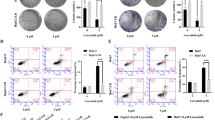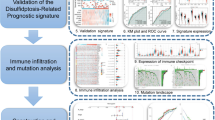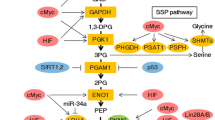Abstract
Background
Reprogramming glucose metabolism, also known as the Warburg effect (aerobic glycolysis), is a hallmark of cancers. Increased tumor glycolysis not only favors rapid cancer cell proliferation but reprograms the immune microenvironment to enable tumor progression. The transcriptional factor ONECUT3 plays key roles in the development of the liver and pancreas, however, limited is known about its oncogenic roles, particularly metabolic reprogramming.
Methods
Immunohistochemistry and Western blotting are applied to determine the expression pattern of ONECUT3 and its clinical relevance in pancreatic ductal adenocarcinoma (PDAC). Knockdown and overexpression strategies are employed to determine the in vitro and in vivo functions of ONECUT3. Chromatin immunoprecipitation, luciferase reporter assay, and gene set enrichment analysis are used to decipher the molecular mechanisms.
Results
The glycolytic metabolism is inversely associated with T-cell infiltration in PDAC. ONECUT3 is identified as a key regulator for PDAC glycolysis and CD8+ T-cell infiltration. Genetic silencing of ONECUT3 inhibits cell proliferation, promotes cell apoptosis, and reduces glycolytic metabolism as evidenced by glucose uptake, lactate production, and extracellular acidification rate. Opposite effects of ONECUT3 are observed in overexpression studies. ONECUT3 enhances aerobic glycolysis via transcriptional regulation of PDK1. Targeting ONECUT3 effectively suppresses tumor growth, increases CD8+ T-cell infiltration, and potentiates anti-PD-1 therapy in PDAC. Pharmacological inhibition of PDK1 also shows a synergistic effect with anti-PD-1 therapy. In clinical setting, ONECUT3 is closely associated with PDK1 expression and T-cell infiltration in PDAC and acts as an independent prognostic factor.
Conclusions
Our study reveals a previous unprecedented regulatory role of ONECUT3 in PDAC glycolysis and provides in vivo evidence that increased glycolysis is linked to an immunosuppressive microenvironment. Moreover, targeting ONECUT3-PDK1 axis may serve as a promising therapeutic approach for the treatment of PDAC.







Similar content being viewed by others
Data Availability
The data generated or analyzed during this study are included in this article.
References
Y. Yuan, H. Li, W. Pu, L. Chen, D. Guo, H. Jiang, B. He, S. Qin, K. Wang, N. Li, J. Feng, J. Wen, S. Cheng, Y. Zhang, W. Yang, D. Ye, Z. Lu, C. Huang, J. Mei, H.F. Zhang, P. Gao, P. Jiang, S. Su, B. Sun, S.M. Zhao, Cancer metabolism and tumor microenvironment: fostering each other? Sci. China Life Sci. 65, 236–279 (2022)
W.H. Koppenol, P.L. Bounds, C.V. Dang, Otto Warburg’s contributions to current concepts of cancer metabolism, Nat. Rev. Cancer. 11, 325–337 (2011)
M.G. Vander Heiden, L.C. Cantley, C.B. Thompson, Understanding the Warburg effect: the metabolic requirements of cell proliferation. Science, 324, 1029–1033 (2009)
L.K. Boroughs, R.J. DeBerardinis, Metabolic pathways promoting cancer cell survival and growth. Nat. Cell Biol. 17, 351–359 (2015)
H. Ying, A.C. Kimmelman, C.A. Lyssiotis, S. Hua, G.C. Chu, E. Fletcher-Sananikone, J.W. Locasale, J. Son, H. Zhang, J.L. Coloff, H. Yan, W. Wang, S. Chen, A. Viale, H. Zheng, J.H. Paik, C. Lim, A.R. Guimaraes, E.S. Martin, J. Chang, A.F. Hezel, S.R. Perry, J. Hu, B. Gan, Y. Xiao, J.M. Asara, R. Weissleder, Y.A. Wang, L. Chin, L.C. Cantley, R.A. DePinho, Oncogenic Kras maintains pancreatic tumors through regulation of anabolic glucose metabolism. Cell. 149, 656–670 (2012)
D.M. Miller, S.D. Thomas, A. Islam, D. Muench, Sedoris, c-Myc and cancer metabolism. Clin. cancer research: official J. Am. Association Cancer Res. 18, 5546–5553 (2012)
J.D. Gordan, C.B. Thompson, M.C. Simon, HIF and c-Myc: sibling rivals for control of cancer cell metabolism and proliferation. Cancer cell. 12, 108–113 (2007)
R.A. Gatenby, R.J. Gillies, Why do cancers have high aerobic glycolysis? Nat. Rev. Cancer. 4, 891–899 (2004)
U.E. Martinez-Outschoorn, M. Peiris-Pages, R.G. Pestell, F. Sotgia, M.P. Lisanti, Cancer metabolism: a therapeutic perspective, Nature reviews. Clin. Oncol. 14, 113 (2017)
C. Harmon, C. O’Farrelly, M.W. Robinson, The Immune Consequences of Lactate in the Tumor Microenvironment. Adv. Exp. Med. Biol. 1259, 113–124 (2020)
L. Sun, C. Suo, S.T. Li, H. Zhang, P. Gao, Metabolic reprogramming for cancer cells and their microenvironment: beyond the Warburg Effect. Biochim. Biophys. Acta Rev. Cancer. 1870, 51–66 (2018)
L. Xia, L. Oyang, J. Lin, S. Tan, Y. Han, N. Wu, P. Yi, L. Tang, Q. Pan, S. Rao, J. Liang, Y. Tang, M. Su, X. Luo, Y. Yang, Y. Shi, H. Wang, Y. Zhou, Q. Liao, The cancer metabolic reprogramming and immune response. Mol. Cancer. 20, 28 (2021)
L. Guerra, L. Bonetti, D. Brenner, Metabolic modulation of immunity: a New Concept in Cancer Immunotherapy. Cell Rep. 32, 107848 (2020)
P.A. Kropp, M. Gannon, Onecut transcription factors in development and disease. Trends Dev. Biol. 9, 43–57 (2016)
F. Rausa, U. Samadani, H. Ye, L. Lim, C.F. Fletcher, N.A. Jenkins, N.G. Copeland, R.H. Costa, The cut-homeodomain transcriptional activator HNF-6 is coexpressed with its target gene HNF-3 beta in the developing murine liver and pancreas. Dev. Biol. 192, 228–246 (1997)
J. van der Raadt, S.H.C. van Gestel, N. Nadif Kasri, C.A. Albers, ONECUT transcription factors induce neuronal characteristics and remodel chromatin accessibility. Nucleic Acids Res. 47, 5587–5602 (2019)
D. Sapkota, H. Chintala, F. Wu, S.J. Fliesler, Z. Hu, X. Mu, Onecut1 and Onecut2 redundantly regulate early retinal cell fates during development. Proc. Natl. Acad. Sci. U.S.A. 111, E4086–4095 (2014)
P.P. Prevot, A. Simion, A. Grimont, M. Colletti, A. Khalaileh, G. Van den Steen, C. Sempoux, X. Xu, V. Roelants, J. Hald, L. Bertrand, H. Heimberg, S.F. Konieczny, Y. Dor, F.P. Lemaigre, P. Jacquemin, Role of the ductal transcription factors HNF6 and Sox9 in pancreatic acinar-to-ductal metaplasia. Gut. 61, 1723–1732 (2012)
S. Heller, Z. Li, Q. Lin, R. Geusz, M. Breunig, M. Hohwieler, X. Zhang, G.G. Nair, T. Seufferlein, M. Hebrok, M. Sander, C. Julier, A. Kleger, I.G. Costa, Transcriptional changes and the role of ONECUT1 in hPSC pancreatic differentiation. Commun. Biol. 4, 1298 (2021)
X. Jiang, W. Zhang, H. Kayed, P. Zheng, N.A. Giese, H. Friess, J. Kleeff, Loss of ONECUT1 expression in human pancreatic cancer cells. Oncol. Rep. 19, 157–163 (2008)
M. Rotinen, S. You, J. Yang, S.G. Coetzee, M. Reis-Sobreiro, W.C. Huang, F. Huang, X. Pan, A. Yanez, D.J. Hazelett, C.Y. Chu, K. Steadman, C.M. Morrissey, P.S. Nelson, E. Corey, L.W.K. Chung, S.J. Freedland, D. Di Vizio, I.P. Garraway, R. Murali, B.S. Knudsen, M.R. Freeman, ONECUT2 is a targetable master regulator of lethal prostate cancer that suppresses the androgen axis. Nat. Med. 24, 1887–1898 (2018)
S.H. Jiang, J. Li, F.Y. Dong, J.Y. Yang, D.J. Liu, X.M. Yang, Y.H. Wang, M.W. Yang, X.L. Fu, X.X. Zhang, Q. Li, X.F. Pang, Y.M. Huo, J. Li, J.F. Zhang, H.Y. Lee, S.J. Lee, W.X. Qin, J.R. Gu, Y.W. Sun, Z.G. Zhang, Increased Serotonin Signaling Contributes to the Warburg Effect in Pancreatic Tumor Cells Under Metabolic Stress and Promotes Growth of Pancreatic Tumors in Mice. Gastroenterology, 153, 277–291 e219 (2017)
Y.H. Zhu, J.H. Zheng, Q.Y. Jia, Z.H. Duan, H.F. Yao, J. Yang, Y.W. Sun, S.H. Jiang, D.J. Liu, Y.M. Huo, Immunosuppression, immune escape, and immunotherapy in pancreatic cancer: focused on the tumor microenvironment. Cell. Oncol. (Dordr). 46, 17–48 (2023)
L.L. Zhu, Z. Wu, R.K. Li, X. Xing, Y.S. Jiang, J. Li, Y.H. Wang, L.P. Hu, X. Wang, W.T. Qin, Y.W. Sun, Z.G. Zhang, Q. Yang, S.H. Jiang, Deciphering the genomic and lncRNA landscapes of aerobic glycolysis identifies potential therapeutic targets in pancreatic cancer. Int. J. Biol. Sci. 17, 107–118 (2021)
S. Spranger, R. Bao, T.F. Gajewski, Melanoma-intrinsic beta-catenin signalling prevents anti-tumour immunity. Nature. 523, 231–235 (2015)
F. Zanconato, G. Battilana, M. Forcato, L. Filippi, L. Azzolin, A. Manfrin, E. Quaranta, D. Di Biagio, G. Sigismondo, V. Guzzardo, P. Lejeune, B. Haendler, J. Krijgsveld, M. Fassan, S. Bicciato, M. Cordenonsi, S. Piccolo, Transcriptional addiction in cancer cells is mediated by YAP/TAZ through BRD4. Nat. Med. 24, 1599–1610 (2018)
P.W. Stacpoole, Therapeutic targeting of the pyruvate dehydrogenase Complex/Pyruvate dehydrogenase kinase (PDC/PDK) Axis in Cancer, J. Natl. Cancer Inst., 109 (2017)
C. Qin, G. Yang, J. Yang, B. Ren, H. Wang, G. Chen, F. Zhao, L. You, W. Wang, Y. Zhao, Metabolism of pancreatic cancer: paving the way to better anticancer strategies. Mol. Cancer. 19, 50 (2020)
P. Dey, J. Li, J. Zhang, S. Chaurasiya, A. Strom, H. Wang, W.T. Liao, F. Cavallaro, P. Denz, V. Bernard, E.Y. Yen, G. Genovese, P. Gulhati, J. Liu, D. Chakravarti, P. Deng, T. Zhang, F. Carbone, Q. Chang, H. Ying, X. Shang, D.J. Spring, B. Ghosh, N. Putluri, A. Maitra, Y.A. Wang, R.A. DePinho, Oncogenic KRAS-Driven Metabolic Reprogramming in Pancreatic Cancer Cells Utilizes Cytokines from the Tumor Microenvironment. Cancer Discov. 10, 608–625 (2020)
C. Zhang, J. Liu, Y. Liang, R. Wu, Y. Zhao, X. Hong, M. Lin, H. Yu, L. Liu, A.J. Levine, W. Hu, Z. Feng, Tumour-associated mutant p53 drives the Warburg effect. Nat. Commun. 4, 2935 (2013)
L. Li, Y. Liang, L. Kang, Y. Liu, S. Gao, S. Chen, Y. Li, W. You, Q. Dong, T. Hong, Z. Yan, S. Jin, T. Wang, W. Zhao, H. Mai, J. Huang, X. Han, Q. Ji, Q. Song, C. Yang, S. Zhao, X. Xu, Q. Ye, Transcriptional regulation of the Warburg Effect in Cancer by SIX1. Cancer cell, 33, 368–385e367 (2018)
Q. Xia, J. Jia, C. Hu, J. Lu, J. Li, H. Xu, J. Fang, D. Feng, L. Wang, Y. Chen, Tumor-associated macrophages promote PD-L1 expression in tumor cells by regulating PKM2 nuclear translocation in pancreatic ductal adenocarcinoma. Oncogene. 41, 865–877 (2022)
F. Demircioglu, J. Wang, J. Candido, A.S.H. Costa, P. Casado, B. de Luxan Delgado, L.E. Reynolds, J. Gomez-Escudero, E. Newport, V. Rajeeve, A.M. Baker, M. Roy-Luzarraga, T.A. Graham, J. Foster, Y. Wang, J.J. Campbell, R. Singh, P. Zhang, T.J. Schall, F.R. Balkwill, J. Sosabowski, P.R. Cutillas, C. Frezza, P. Sancho, Hodivala-Dilke, Cancer associated fibroblast FAK regulates malignant cell metabolism. Nat. Commun. 11, 1290 (2020)
S.T. Paijens, A. Vledder, M. de Bruyn, H.W. Nijman, Tumor-infiltrating lymphocytes in the immunotherapy era. Cell. Mol. Immunol. 18, 842–859 (2021)
C.H. Chang, J.D. Curtis, L.B. Jr. Maggi, B. Faubert, A.V. Villarino, D. O’Sullivan, S.C. Huang, G.J. van der Windt, J. Blagih, J. Qiu, J.D. Weber, E.J. Pearce, R.G. Jones, E.L. Pearce, Posttranscriptional control of T cell effector function by aerobic glycolysis. Cell. 153, 1239–1251 (2013)
C.H. Chang, J. Qiu, D. O’Sullivan, M.D. Buck, T. Noguchi, J.D. Curtis, Q. Chen, M. Gindin, M.M. Gubin, G.J. van der Windt, E. Tonc, R.D. Schreiber, E.J. Pearce, E.L. Pearce, Metabolic Competition in the Tumor Microenvironment Is a Driver of Cancer Progression. Cell, 162, 1229–1241 (2015)
E. Gottfried, L.A. Kunz-Schughart, S. Ebner, W. Mueller-Klieser, S. Hoves, R. Andreesen, A. Mackensen, M. Kreutz, Tumor-derived lactic acid modulates dendritic cell activation and antigen expression. Blood. 107, 2013–2021 (2006)
O.R. Colegio, N.Q. Chu, A.L. Szabo, T. Chu, A.M. Rhebergen, V. Jairam, N. Cyrus, C.E. Brokowski, S.C. Eisenbarth, G.M. Phillips, G.W. Cline, A.J. Phillips, R. Medzhitov, Functional polarization of tumour-associated macrophages by tumour-derived lactic acid. Nature. 513, 559–563 (2014)
K. Litchfield, J.L. Reading, C. Puttick, K. Thakkar, C. Abbosh, R. Bentham, T.B.K. Watkins, R. Rosenthal, D. Biswas, A. Rowan, E. Lim, M. Al Bakir, V. Turati, J.A. Guerra-Assuncao, L. Conde, A.J.S. Furness, S.K. Saini, S.R. Hadrup, J. Herrero, S.H. Lee, P. Van Loo, T. Enver, J. Larkin, M.D. Hellmann, S. Turajlic, S.A. Quezada, N. McGranahan, C. Swanton, Meta-analysis of tumor- and T cell-intrinsic mechanisms of sensitization to checkpoint inhibition. Cell, 184, 596–614 e514 (2021)
T. Lu, B. Wu, Y. Yu, W. Zhu, S. Zhang, Y. Zhang, J. Guo, N. Deng, Blockade of ONECUT2 expression in ovarian cancer inhibited tumor cell proliferation, migration, invasion and angiogenesis. Cancer Sci. 109, 2221–2234 (2018)
M. Shen, C. Dong, X. Ruan, W. Yan, M. Cao, D. Pizzo, X. Wu, L. Yang, L. Liu, X. Ren, S.E. Wang, Chemotherapy-Induced Extracellular Vesicle miRNAs promote breast Cancer stemness by targeting ONECUT2, Cancer Res. 79, 3608–3621 (2019)
H. Guo, X. Ci, M. Ahmed, J.T. Hua, F. Soares, D. Lin, L. Puca, A. Vosoughi, H. Xue, E. Li, P. Su, S. Chen, T. Nguyen, Y. Liang, Y. Zhang, X. Xu, J. Xu, A.V. Sheahan, W. Ba-Alawi, S. Zhang, O. Mahamud, R.N. Vellanki, M. Gleave, R.G. Bristow, B. Haibe-Kains, J.T. Poirier, C.M. Rudin, M.S. Tsao, B.G. Wouters, L. Fazli, F.Y. Feng, L. Ellis, T. van der Kwast, A. Berlin, M. Koritzinsky, P.C. Boutros, A. Zoubeidi, H. Beltran, Y. Wang, H.H. He, ONECUT2 is a driver of neuroendocrine prostate cancer. Nat. Commun. 10, 278 (2019)
S. Anwar, A. Shamsi, T. Mohammad, A. Islam, M.I. Hassan, Targeting pyruvate dehydrogenase kinase signaling in the development of effective cancer therapy. Biochim. Biophys. Acta Rev. Cancer. 1876, 188568 (2021)
J.W. Kim, I. Tchernyshyov, G.L. Semenza, C.V. Dang, HIF-1-mediated expression of pyruvate dehydrogenase kinase: a metabolic switch required for cellular adaptation to hypoxia. Cell Metabol. 3, 177–185 (2006)
Acknowledgements
This research was funded by the Jiading District Medical Key Discipline Foundation of Shanghai, China, grant number 2020-jdyxzdxk-06.
Author information
Authors and Affiliations
Contributions
Peng-Cheng Chen, Yong Ning, Shu-Heng Jiang and Jin-Gen Su performed the experiments. Hui Li contributed bioinformatic analysis. Pei-Dong Shi, Run-Sheng Guo, Shu-Heng Jiang and Jiang-Bo Shen contributed to the conception and design of these studies. Peng-Cheng Chen and Qin-Chun Feng analyzed the data. All authors reviewed the manuscript.
Corresponding authors
Ethics declarations
Competing interests
The authors declare no competing interests.
Conflict of Interest
The authors declare that there is no conflict of interests.
Additional information
Publisher’s Note
Springer Nature remains neutral with regard to jurisdictional claims in published maps and institutional affiliations.
Electronic supplementary material
Below is the link to the electronic supplementary material.
Rights and permissions
Springer Nature or its licensor (e.g. a society or other partner) holds exclusive rights to this article under a publishing agreement with the author(s) or other rightsholder(s); author self-archiving of the accepted manuscript version of this article is solely governed by the terms of such publishing agreement and applicable law.
About this article
Cite this article
Chen, PC., Ning, Y., Li, H. et al. Targeting ONECUT3 blocks glycolytic metabolism and potentiates anti-PD-1 therapy in pancreatic cancer. Cell Oncol. 47, 81–96 (2024). https://doi.org/10.1007/s13402-023-00852-3
Accepted:
Published:
Issue Date:
DOI: https://doi.org/10.1007/s13402-023-00852-3




